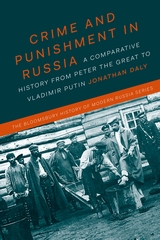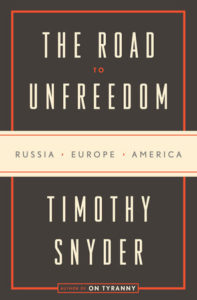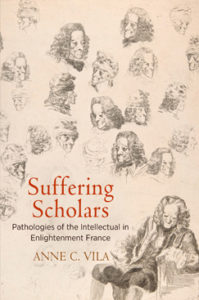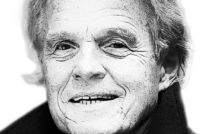
 Crime and Punishment in Russia: A Comparative History from Peter the Great to Vladimir Putin
Crime and Punishment in Russia: A Comparative History from Peter the Great to Vladimir Putin
By Jonathan Daly
Publisher: Bloomsbury Publishing
Recommended by Samantha Lomb
Jonathan Daly is a professor of History at the University of Illinois at Chicago. His newest book Crime and Punishment in Russia provides a comprehensive overview of the development of the criminal justice system in Russia from the 1700s to the present. Rather than following the typical narrative of Russia being a backwards, Asiatic state that struggled to modernize, Daly begins the book noting that “Russia developed as one of the most successful states in human history.” He highlights the achievements of the Russian state, such as the 1649 Ulozhenie, (which was one of the most detailed and elaborate law codes devised in the early modern world), Empress Elizabeth’s curtailment of capital punishment, the 1864 judicial reform (in which Russia became the first non-Western country to establish an independent judiciary functioning largely according to Western best practices), early Bolshevik criminal justice for regular (as opposed to “political”) offenders aimed at a level of humaneness rare in the world in the early 1920s and post-Soviet Russia’s enormous efforts to develop law according to international best practices. At the same time he rightfully notes Russia’s reputation as a despotic power with a weak rule of law tradition and asks how these contradictions evolved within Russia’s criminal justice system. In seeking to answer this question, Daly focuses on the continuation of strong personal, informal factors in Russian governance and the Russian preference for the rule of authoritative persons rather than of law to unify the practices of three ideologically disparate regimes. Crime and Punishment in Russia provides a clear, concise, and informative historical look at the evolution of criminal justice in Russia.
The Road to Unfreedom: Russia, Europe, America
By Timothy Snyder
Publisher: Tim Duggan Books
Recommended by Louie Dean Valencia-García
In a year crowded with important books from the likes of Madeleine Albright, James Comey, and Michael Wolff, Timothy Snyder’s The Road to Unfreedom: Russia, Europe, America might be the most vital and groundbreaking book to date. Snyder has delivered the first scholarly book to seriously place the rise of both neo-fascism in eastern Europe and Vladimir Putin and Donald Trump into historical perspective. This is not a warning about fascism but rather an alarm going off. In the book, the historian delineates two contemporary constructions of historical thinking and politics—what he calls “the politics of inevitability” and “the politics of eternity.” For Snyder, the idea of “politics of inevitability,” or the belief that “the future is just more of the present…laws of progress are known… there are no alternatives, and there is nothing really to be done.” Snyder describes this version of politics as having had two dominant narratives. In the American capitalist version, nature created the markets, which brought forth democracy and happiness. In the European version, “history brought the nation, which learned from war that peace was good, and hence chose integration and prosperity.”
Perhaps partially because of the failure of those promises of happiness and prosperity under the conditions of late-capitalism, a new zombified authoritarian fascist threat has arisen. For Snyder, the politics of eternity “places one nation at the center of a cyclical story of victimhood. Time is no longer a line into the future, but a circle that endlessly returns the same threats from the past…Eternity politicians spread the conviction that government cannot aid society as a whole, but can only guard against threats.” However, these politics of eternity and inevitability should not be considered in contrast. Rather, Snyder believes, “The politics of inevitability…erodes civic responsibility, and then collapses into the politics of eternity when it meets a serious challenge. Americans reacted in these ways when Russia’s candidate became president of the United States.” Snyder describes today’s fascism rising as a result of the revival of the Russian fascist philosopher Ivan Ilyin, whose ideologies inform Putin’s own ideological framework. Snyder argues, “[Ilyin’s fascism]…had three core features: it celebrated will and violence over reason and law; it proposed a leader with a mystical connection to his people; and it characterized globalization as a conspiracy rather than as a set of problems.” Snyder continues, “[Ilyin] is a guide on the darkening road to unfreedom, which leads from inevitability to eternity.” If this politics of eternity prevails, as Snyder claims, our very idea of democracy will crumble, leaving way for a fascist “racial oligarchy” to emerge.
 Suffering Scholars: Pathologies of the Intellectual in Enlightenment France
Suffering Scholars: Pathologies of the Intellectual in Enlightenment France
By Anne C. Vila
Publisher: University of Pennsylvania Press
Recommended by Hélène B. Ducros
Although humanist François Rabelais in the sixteenth century had made mens sana in corpore sano his maxim, by the time of the French Revolution the idea of sickness from “literary intemperance”, or excessive zeal for mental labor, had emerged. Melancholy, manias, infirmities, invalidism, vapors, frailty, ailments, passions, nervous sensibilities, hypochondria, or hysteria- the “ills of overstudy” are the topics of this captivating book. Set in France between 1720 and 1840, date at which the medical profession is said to have lost interest in the corporeal singularity of cerebralists, the six chapters that constitute Vila’s opus unveil the ways in which reflections over the interplay of studious bodies and minds led to the complex overlap of philosophical, hygienist and medical discourses. Casting light on representations of the maladies des gens de lettres syndrome as grounded in meditative isolation from the body politic, withdrawal from society and reclusiveness, the author shows how the character of the ailing philosopher came to be constructed. The gradual pathologization of scholarly endeavors in pre- and post-revolutionary France is evidenced in the review of medical treatises of the time, from which arose a medical typology of learning-induced mental, moral and bodily maladies.
In delving into how intense intellectual work pushed to the extreme of over-cerebration was understood to impact the physical body during the French Enlightenment, Vila proposes a literary journey through, among others, the works of Voltaire, Diderot and Montesquieu, as well as Marivaux, Rousseau and Madame de Staël, with the latter enabling a discussion of gender and the place of the woman philosopher in the debate over the pathological construction of the thinker’s “physio-moral exceptionalness” in the eighteenth and early nineteenth century. Suffering Scholars allows for an original and useful new gaze onto iconic figures of the Enlightenment by repositioning them in a cultural context often invisible, before social concerns switched to issues of poverty as primarily detrimental to health. Presenting the afflicted scholar as a phenomenon worthy of attention in the cultural history of France and Europe, the book triggers further interrogations about the making of intellectual icons, the role of medicine in popularizing and norming the somatic thinker, and the mind-body dualist perspective in physiological literary criticism, as well as medical ideologies and psychological therapies in anxious times.




